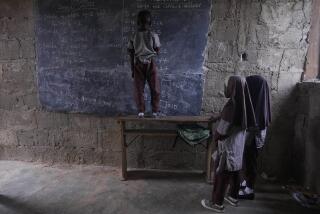Plugging In : Foundation Hopes to Help Correct Africa’s Shortage of Electricity
- Share via
During Allen Herbert’s first trip to South Africa in 1990, a light bulb went off in his head. He had generated an idea about electricity.
Aside from apartheid, the lack of electricity was what people complained about most in the townships and outlying areas that Herbert visited.
“I saw how the apartheid regimes used electricity to control people,” said Herbert, 31, of San Pedro. “(Residents) would actually pray for them not to turn the electricity off.”
Herbert was first invited to South Africa by David Molapo, head of the South African Student Christian Assn. Herbert, who met with members of the black business community, spent the three-week trip with families in various townships and was inspired to do something about the electricity problem.
After trips to Botswana and Namibia, as well as other visits to South Africa, Herbert, co-owner of an electronics equipment and supply company in San Pedro, realized getting electricity to the people was not the only issue. African electrical engineers and American utility companies also needed to exchange information and learn about their different cultures, he found.
So last year, Herbert and his business partner and cousin, John Butler of South-Central, created the African Electrification Foundation to start the communication link and help improve conditions throughout Africa.
Part of the plan would allow the United States and the African nations to share information through exchange programs for college students and professors. It would also include bringing electricity to many parts of the continent’s overpopulated and underdeveloped countries.
“People don’t realize there are engineers in Africa,” said Herbert, who rattles off statistics and information about Africa and electricity. “Technology and Africa don’t mix in people’s heads for some reason.”
The foundation recently hosted the first delegation of African engineers to the United States.
The 13-member delegation, recent graduates of the Inter-African Electrical Engineering College of Western Africa, in the Ivory Coast, toured power plants and businesses involved in energy and electricity in five cities, including numerous operations in Los Angeles County.
“Being here gives us the opportunity to see how things are manufactured, how we can conserve the electricity we have and still distribute it to other parts,” said Halid Alhassane, 25, of the Ivory Coast during a visit to the Los Angeles Department of Water and Power’s main building on Hope Street.
The engineering college was built in 1979 by a consortium of 27 power companies in western Africa as an alternative to sending Africans to European engineering schools. Students at the school come from such countries as Chad, Niger, Guinea and the Ivory Coast.
“For us, these tours are a supplement to the training at the school,” said Issiaka B. Ly, head of communications at the school. “We are concerned about where the future is heading for our countries, and if we can learn about what happens here, we can get a head start.”
For years, graduates from the school visited European countries to learn electricity and energy techniques. No invitations were ever extended by the United States, Ly said.
In February, the school looked into a visit on its own and was connected to the African Electrification Foundation, which organized the monthlong trip that included stops in Los Angeles, Washington, Houston, Atlanta and upstate New York.
With the growing focus on providing assistance to the world’s developing countries to improve their utilities, Africa, a continent rich in resources with a high potential for development and investment, cannot be overlooked, Herbert said.
“Electricity and roads are the basic things needed for any kind of industrialization,” said Herbert, a USC graduate who studied aerospace engineering. “What we’re doing is no different than what has been done in other countries. It’s just that many parts of Africa have been ignored.”
Added Butler: “There’s incredible potential for investment all over Africa, but business relationships can’t be developed and nurtured without communication, and that can’t happen without electricity.”
Herbert, who has studied Africa since age 12, said the people he most wants to educate about getting electricity to all parts of developing African countries are African-Americans. It was black employees in energy and electrical-related industries who finally helped Herbert and Butler organize the trip.
“This visit gives us a future of communication with these engineers and with their countries to exchange information on energy resources,” said Terris Watson, an electrical shop supervisor for Southern California Edison and a board member of the electrification foundation.
“Let’s just hope it doesn’t stop there,” Watson said.
Herbert and Butler do not intend to stop. Part of their plan is to begin an exchange program for African-American engineering students to study at the western African school.
“We already have a cultural bridge with Africa,” Herbert said. “Now we have to start building that technological bridge.”
More to Read
Sign up for Essential California
The most important California stories and recommendations in your inbox every morning.
You may occasionally receive promotional content from the Los Angeles Times.












